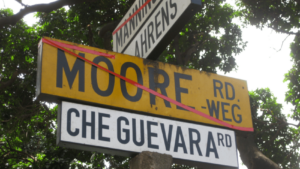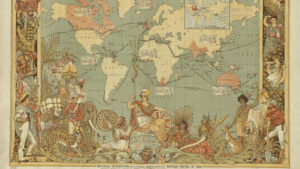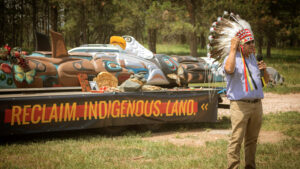3:45-5:00 pm ET
The National Environmental Protection Act, National Historic Preservation Act, and other federal policies were drawn up to protect sensitive ecosystems, sacred and historic places, and ancestral lands and waters against the worst impacts of industrial development, yet time and again they fail. What struggles gave rise to these protections? What are the limitations and failures of current laws and policies? And how are communities, legal activists, conservationists and historic preservationists reinterpreting case law to give communities greater decision-making power, leveraging existing policies to stall industrial development through the courts, and pushing for new laws and policies that can more effectively protect what is sacred for the generations to come?
A Red Natural History launch event, organized by The Natural History Museum. Co-sponsored by Survival International and the Center for the Humanities at CUNY Graduate Center.
SPEAKERS
President Whitney Gravelle (Bay Mills Indian Community) is Chair of the Bay Mills Indian Community, “Gnoozhekaaning” (Place of the Pike) in the Upper Peninsula of Michigan. After graduating from Michigan State University College of Law in 2016 with a Juris Doctorate and a certificate from the Indigenous Law Program, President Gravelle worked for the Department of Justice with the Environment and Natural Resource Division in the Indian Resource Section, served as Chief Judge of Bay Mills Tribal Court, and again as In-House Counsel for Bay Mills Indian Community. Currently, she serves as President of the Executive Council on behalf of Bay Mills Indian Community; and sits as a commissioner on the Michigan Advisory Council on Environmental Justice and the Board of Directors of the Inter-Tribal Council of Michigan.
Wesley Furlong is an Attorney at Native American Rights Fund (NARF) in Anchorage, Alaska. He joined NARF in 2016 as the inaugural Alaska Fellow. Wes’s practice focuses primarily on the protection of traditional cultural places and landscapes and tribal cultural resources. His work emphasizes tribal cultural survivance through the advancement of Indigenous concepts of cultural resource stewardship within the National Historic Preservation Act and other federal laws. Wes has represented Tribes, tribal consortia, and tribal organizations in Alaska and the Lower 48 in federal and state litigation, in NEPA and Section 106 processes for large-scale and contentious resource development projects, National Register nominations, federal rulemaking, and the development of Section 106 program alternatives. Wes’s practice also includes treaty rights, tribal jurisdiction and sovereignty, substance rights, sovereign immunity, and constitutional law. He has also published extensive scholarship on traditional cultural landscapes, cultural resource protection, treaty rights, and habitat restoration.
Judith LeBlanc (Caddo) is Executive Director of the Native Organizers Alliance and a board member of The Natural History Museum. As the executive director of Native Organizers Alliance (NOA), she leads a national Native training and organizing network which supports tribes, traditional societies, and grassroots community groups in urban and tribal communities. Judith is part of a growing circle of Indian Country leaders who understand the necessity for an organized, durable ecosystem of Native leaders and organizers who lead with traditional values. NOA leads learning circles, training, and strategic planning sessions to support Native leaders in organizing the grassroots movements for structural reforms, leading to Native sovereignty and racial equity for all. Judith has worked since 2016 with the Brave Heart Society, a traditional Dakota women’s society, and the Yankton Sioux Tribe on the Mni Wakan Wizipan. It is a project to re-establish the Yankton Sioux and other Oceti Sakowin tribes’ inherent rights to co-management the Missouri River bio-region. Judith is a board member of IllumiNative and chair of the board of NDN. She is a 2019 Roddenberry Fellow. Judith is a member of the Caddo Tribe.







